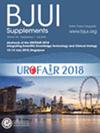Can ChatGPT pass the urology fellowship examination? Artificial intelligence capability in surgical training assessment
IF 3.7
2区 医学
Q1 UROLOGY & NEPHROLOGY
引用次数: 0
Abstract
ObjectivesTo assess the performance of ChatGPT compared to human trainees in the Australian Urology written fellowship examination (essay format).Materials and MethodsEach examination was marked independently by two blinded examining urologists and assessed for: overall pass/failure; proportion of passing questions; and adjusted aggregate score. Examining urologists also made a blinded judgement as to authorship (artificial intelligence [AI] or trainee).ResultsA total of 20 examination papers were marked; 10 completed by urology trainees and 10 by AI platforms (half each on ChatGPT‐3.5 and ‐4.0). Overall, 9/10 of trainees successfully passed the urology fellowship, whereas only 6/10 of ChatGPT examinations passed (ChatGPT能通过泌尿外科医师资格考试吗?人工智能在外科训练评估中的应用
目的评估ChatGPT与人类学员在澳大利亚泌尿外科书面奖学金考试(论文形式)中的表现。材料和方法每项检查由两名盲法检查泌尿科医生独立评分,并评估:总体合格/不合格;通过率;以及调整后的总分。检查泌尿科医生也对作者(人工智能[AI]或实习生)做出了盲目的判断。结果共批改试卷20份;10个由泌尿外科实习生完成,10个由人工智能平台完成(ChatGPT‐3.5和‐4.0各占一半)。总体而言,9/10的受训者成功通过了泌尿科奖学金,而只有6/10的ChatGPT考试通过了(P = 0.3)。在ChatGPT未通过的考试中,3/4是由ChatGPT‐3.5平台进行的。与ChatGPT相比,学员每次考试的通过率更高:平均89.4% vs 80.9% (P = 0.2)。学员调整后的总分也略高于ChatGPT:平均79.2% vs 78.1% (P = 0.8)。ChatGPT‐3.5和ChatGPT‐4.0的总得分相似(78.9%和77.4%,P = 0.8)。然而,ChatGPT‐3.5的每次考试通过率较低:平均79.6% vs 82.1% (P = 0.8)。检查泌尿科医生错误地分配了两项检查(两名实习候选人都被认为是ChatGPT);因此,识别ChatGPT作者的敏感性为100%,总体准确率为91.7%。总的来说,ChatGPT在澳大利亚泌尿学奖学金笔试中的表现不如人类学员。考官能够高度准确地识别人工智能生成的答案。
本文章由计算机程序翻译,如有差异,请以英文原文为准。
求助全文
约1分钟内获得全文
求助全文
来源期刊

BJU International
医学-泌尿学与肾脏学
CiteScore
9.10
自引率
4.40%
发文量
262
审稿时长
1 months
期刊介绍:
BJUI is one of the most highly respected medical journals in the world, with a truly international range of published papers and appeal. Every issue gives invaluable practical information in the form of original articles, reviews, comments, surgical education articles, and translational science articles in the field of urology. BJUI employs topical sections, and is in full colour, making it easier to browse or search for something specific.
 求助内容:
求助内容: 应助结果提醒方式:
应助结果提醒方式:


